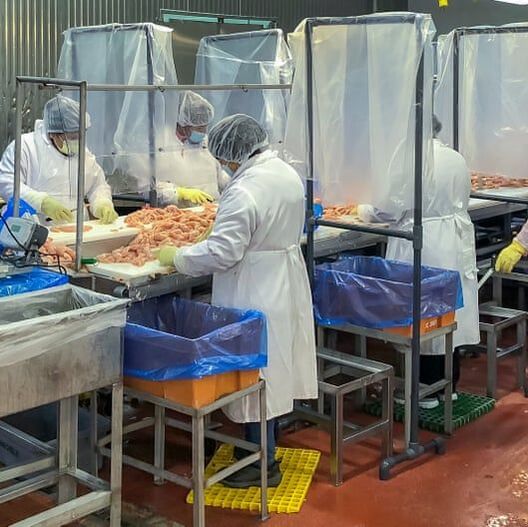8. Exploitation of Workers During the CoronavirusExploitation of workers is another issue that is constantly present yet usually ignored. Although the coronavirus certainly hasn't been good for the nation or world, one thing it has done is highlight inequalities and exploitation. Karl Marx wrote of worker exploitation that "...labourers... are a commodity, like every other article of commerce, and are consequently exposed to all the vicissitudes of competition, to all the fluctuations of the market" (5). This quote is still true today, and has been especially true for meat plant workers during the coronavirus. In an article for The Guardian, one plant worker for Tyson said that "'Tyson really aren't going to give a fuck about us at all...For us employees that work in production, we are treated like modern-day slaves.'" (2020). Despite there being deaths from coronavirus of workers in these facilities, they stay open because of an executive order issued by Donald Trump (The Guardian 2020). This relates to how Karl Marx describes the exploitation of the worker because of how the health of the worker is completely ignored. Even though there is a risk of death from working in these facilities, this fact is ignored so that production can continue to happen.
Marx, Karl. "The Communist Manifesto." In The Marx-Engels Reader, edited by Robert Tucker, 1-22. 2nd Edition. New York: WW Norton and Co.
2020. "'We're Modern Slaves': How Meat Plant Workers Became the New Frontline in Covid-19 War." The Guardian, May 2, 2020. https://www.theguardian .com/world/2020/may/02/meat-plant-workers-us-coronavirus-war |
9. Self-Interested Companies Not Giving Refunds
Adam Smith wrote about how all of our actions come from a place of self-interest, although this is usually mutually beneficial (1776, 1). Nevertheless, during this time it is not necessarily in the self-interest of companies to help their consumer, as is the case for airlines and event-ticketing companies. Although many institutions are offering refunds and financial help to consumers, for these types of industries their self-interest in keeping a profit has outweighed their self-interest in helping customers. Ticketmaster, for example, has stipulated that "a show has to be either officially canceled or have new dates announced in order for the purchaser to be eligible for refunds" (Limbong 2020). This can be harmful to customers because many future shows have not announced whether or not they are canceled, but it is within the self-interest of Ticketmaster to keep their customers' money because much of it has already been given to artists and venues and they wouldn't want to not only lose profit but also go into debt. Something similar is happening with airlines as "only two airlines- Allegiant and Spirit- told lawmakers that they are providing refunds to consumers who are proactively cancelling traveling because of the global pandemic" (Passy 2020). This is similar to Ticketmaster and other ticketing companies because most airlines will only offer refunds when their flights are actually canceled- even if consumers know their travel won't happen or won't go anyway for health reasons. Both of these examples show how helping people is not usually done out of benevolence, but only if it is advantageous to those giving the help (Smith 1776, 1).
Limbong, Andrew. 2020. "Why Ticket Holders Are Struggling To Get Refunds For Concerts And Live Events." NPR, April 24, 2020. https://www.npr.org /2020/04/24/844301434/why-ticket-holders-are-struggling-to-get-refunds-for-concerts-and-live-events
Passy, Jacob. 2020. "Airlines are issuing billions of dollars in vouchers- but can you still get a cash refund for coronavirus-related flight cancellations?" Market Watch, April 20, 2020. https://www.marketwatch.com/story/airlines-are-sitting-on-over-10-billion-in-vouchers-as-they-refuse-refunds-for-coronavirus-cancellations-democratic-senators-say-2020-04-17.
Smith, Adam. 1776. Selection from The Wealth of Nations. Excerpted by Susan E. Gallagher, UMASS Lowell.
Passy, Jacob. 2020. "Airlines are issuing billions of dollars in vouchers- but can you still get a cash refund for coronavirus-related flight cancellations?" Market Watch, April 20, 2020. https://www.marketwatch.com/story/airlines-are-sitting-on-over-10-billion-in-vouchers-as-they-refuse-refunds-for-coronavirus-cancellations-democratic-senators-say-2020-04-17.
Smith, Adam. 1776. Selection from The Wealth of Nations. Excerpted by Susan E. Gallagher, UMASS Lowell.
10. Worker Surveillance During the CoronavirusMichel Foucault wrote about the power of the Panopticon, a specific building that could be implemented in any institution to create both docile and capable workers (1995 [1977], 200). He stated that the major effect of the Panopticon are "to induce in the inmate a state of conscious and permanent visibility that assures the automatic functioning of power" (1995 [1977], 201). Now that employees are working from home due to the coronavirus, we are seeing this same concept in action with more and more employers mandating the use of surveillance software. Foucault also wrote that one of the reasons the Panopticon was so useful was because "the perfection of power should tend to render its actual exercise unnecessary" (1995 [1977], 201). This is because the Panopticon's surveillance was "visible and unverifiable", which causes those surveilled to self-discipline as they never know when they are being watched or not (1995 [1977], 201). The same is happening with workers whose employers are using software such as Hubstaff or ActivTrack to monitor them. Adam Satariano, a reporter for the New York Times, voluntarily tried out Hubstaff and said it changed his behavior: "knowing my online actions could be reviewed, I did not spend (as much) time reading about sports, and rarely opened messaging apps on my laptop..." (2020). This power dynamic is what makes it so the worker will automatically correct their own behavior without the employer even having to check on them. Although this does make the worker more productive, it comes at a cost to their mental health and privacy. Satariano noted that "the monitoring systems have few safeguards to prevent abuse, and they rely on managers exercising judgment and restraint" (2020). Although these surveillance softwares do create docile and capable workers, they completely disregard the rights of those they surveil.
Foucault, Michel. 1995 [1977]. "Panopticism." In Discipline and Punish: The Birth of the Prison, 195-209. New York: Random House.
Satariano, Adam. 2020. "How My Boss Monitors Me While I Work From Home." The New York Times, May 6, 2020. https://www.nytimes.com/2020/05 /06/technology/employee-monitoring-work-from-home-virus.html. |



